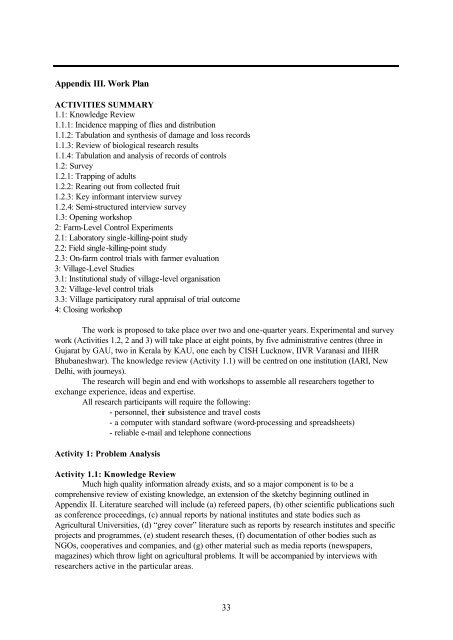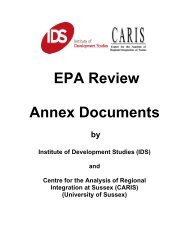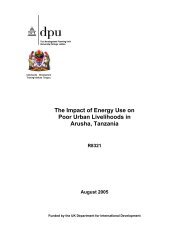“Key Informant Survey” of Production, Value, Losses and ... - DfID
“Key Informant Survey” of Production, Value, Losses and ... - DfID
“Key Informant Survey” of Production, Value, Losses and ... - DfID
You also want an ePaper? Increase the reach of your titles
YUMPU automatically turns print PDFs into web optimized ePapers that Google loves.
Appendix III. Work Plan<br />
ACTIVITIES SUMMARY<br />
1.1: Knowledge Review<br />
1.1.1: Incidence mapping <strong>of</strong> flies <strong>and</strong> distribution<br />
1.1.2: Tabulation <strong>and</strong> synthesis <strong>of</strong> damage <strong>and</strong> loss records<br />
1.1.3: Review <strong>of</strong> biological research results<br />
1.1.4: Tabulation <strong>and</strong> analysis <strong>of</strong> records <strong>of</strong> controls<br />
1.2: Survey<br />
1.2.1: Trapping <strong>of</strong> adults<br />
1.2.2: Rearing out from collected fruit<br />
1.2.3: Key informant interview survey<br />
1.2.4: Semi-structured interview survey<br />
1.3: Opening workshop<br />
2: Farm-Level Control Experiments<br />
2.1: Laboratory single-killing-point study<br />
2.2: Field single-killing-point study<br />
2.3: On-farm control trials with farmer evaluation<br />
3: Village-Level Studies<br />
3.1: Institutional study <strong>of</strong> village-level organisation<br />
3.2: Village-level control trials<br />
3.3: Village participatory rural appraisal <strong>of</strong> trial outcome<br />
4: Closing workshop<br />
The work is proposed to take place over two <strong>and</strong> one-quarter years. Experimental <strong>and</strong> survey<br />
work (Activities 1.2, 2 <strong>and</strong> 3) will take place at eight points, by five administrative centres (three in<br />
Gujarat by GAU, two in Kerala by KAU, one each by CISH Lucknow, IIVR Varanasi <strong>and</strong> IIHR<br />
Bhubaneshwar). The knowledge review (Activity 1.1) will be centred on one institution (IARI, New<br />
Delhi, with journeys).<br />
The research will begin <strong>and</strong> end with workshops to assemble all researchers together to<br />
exchange experience, ideas <strong>and</strong> expertise.<br />
All research participants will require the following:<br />
- personnel, their subsistence <strong>and</strong> travel costs<br />
- a computer with st<strong>and</strong>ard s<strong>of</strong>tware (word-processing <strong>and</strong> spreadsheets)<br />
- reliable e-mail <strong>and</strong> telephone connections<br />
Activity 1: Problem Analysis<br />
Activity 1.1: Knowledge Review<br />
Much high quality information already exists, <strong>and</strong> so a major component is to be a<br />
comprehensive review <strong>of</strong> existing knowledge, an extension <strong>of</strong> the sketchy beginning outlined in<br />
Appendix II. Literature searched will include (a) refereed papers, (b) other scientific publications such<br />
as conference proceedings, (c) annual reports by national institutes <strong>and</strong> state bodies such as<br />
Agricultural Universities, (d) “grey cover” literature such as reports by research institutes <strong>and</strong> specific<br />
projects <strong>and</strong> programmes, (e) student research theses, (f) documentation <strong>of</strong> other bodies such as<br />
NGOs, cooperatives <strong>and</strong> companies, <strong>and</strong> (g) other material such as media reports (newspapers,<br />
magazines) which throw light on agricultural problems. It will be accompanied by interviews with<br />
researchers active in the particular areas.<br />
33

















